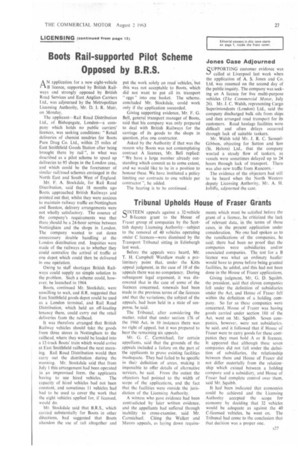Tribunal Upholds House of Fraser Grants
Page 29

If you've noticed an error in this article please click here to report it so we can fix it.
Q1XTEEN appeals against a 32-vehicle B-licence grant to the House of Fraser group of companies by the Scottish deputy Licensing Authority—subject to the removal of 40 vehicles operating under C licences—were dismissed by the Transport Tribunal sitting in Edinburgh last week.
Before the appeals were heard, Mr. T. H. Campbell Wardlaw made a preliminary point that, under the Kitts appeal judgment, in the case of 10 of the appeals there was no competency. During subsequent legal argument, it was discovered that in the case of some of the licences concerned, renewals had been made in the previous terms of the licences and that the variations, the subject of the appeals, had been held in a state of suspense, he said.
The Tribunal, after considering the matter, ruled that under section 176 of the 1960 Act, in 10 instances there was no right of appeal, but it was prepared to hear the remaining six appeals.
Mr. G. C. Carmichael, for certain appellants, said that the grounds of the appeals included a failure on the part of the applicants to prove existing facilities inadequate. They had failed to be specific in their definition of areas, making it impossible to offer details of alternative services, he said. From the outset the objectors had pointed to the width of scope of the applications, and the fact that the facilities were outside the jurisdiction of the Licensing Authority.
A witness who gave evidence had been contradicted by later written evidence, and the appellants had suffered through inability to cross-examine, said Mr. Carmichael. Citing the Walker and Munro appeals, as laying down require
ments which must be satisfied before the grant of a licence, he criticized the lack of relevant data, in the terms of those cases, in the present application under consideration. No one had spoken as to the ramifications of -the companies, he said; there had been no proof that the companies were subsidiaries andjor associated companies. The test for a B licence was what an ordinary haulier would have to prove before being granted facilities, he added, and this had not been done in the House of Fraser applications.
Giving judgment, Mr. G. D. Squibb. the president, said that eleven companies fell under the definition of subsidiaries under the Act, and House of Fraser fell within the definition of a holding company. So far as .these companies were concerned. House of Fraser was having goods carried under section 1.80 of the Act, went on Mr. Squibb. Seven companies, however, were not subsidiaries. he said, and it followed that if House of Fraser were to carry goods for these cornpanics they must hold A or B licences. It appeared that although these seven companies did not fall under the definition of subsidiaries, the relationship between them and House of Fraser did not differ materially from the relation: ship which existed between a holding company and a subsidiary, and House of Fraser had complete control over them, said Mr. Squibb.
It had been indicated that economies could be achieved and thc Licensing Authority accepted the scope for economy by deciding that 32 vehicles would be adequate as against the 40 C-licensed vehicles. he went on. The Tribunal had conic to the conclusion that that decision was a proper one.




























































































